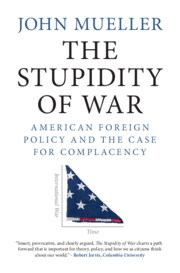Book contents
- The Stupidity of War
- The Stupidity of War
- Copyright page
- Dedication
- Contents
- Figures
- Acknowledgements
- Additional material
- Prologue The Rise of War Aversion and the Decline of International War
- Part I Assessing the Threat Record
- 1 Korea, Massive Extrapolation, Deterrence, and the Crisis Circus
- 2 Containment, Vietnam, and the Curious End of the Cold War
- 3 Military Intervention and the Continued Quest for Threat after the Cold War
- 4 Al-Qaeda and the 9/11 Wars in Afghanistan, Iraq, Pakistan
- 5 Chasing Terrorists Around the Globe and Other Post-9/11 Ventures
- Part II Evaluating Present Threats
- Afterword Aversion to International War as an Explanatory Variable
- Appendix: A Sardonic Litany
- Notes
- References
- Index
1 - Korea, Massive Extrapolation, Deterrence, and the Crisis Circus
from Part I - Assessing the Threat Record
Published online by Cambridge University Press: 01 March 2021
- The Stupidity of War
- The Stupidity of War
- Copyright page
- Dedication
- Contents
- Figures
- Acknowledgements
- Additional material
- Prologue The Rise of War Aversion and the Decline of International War
- Part I Assessing the Threat Record
- 1 Korea, Massive Extrapolation, Deterrence, and the Crisis Circus
- 2 Containment, Vietnam, and the Curious End of the Cold War
- 3 Military Intervention and the Continued Quest for Threat after the Cold War
- 4 Al-Qaeda and the 9/11 Wars in Afghanistan, Iraq, Pakistan
- 5 Chasing Terrorists Around the Globe and Other Post-9/11 Ventures
- Part II Evaluating Present Threats
- Afterword Aversion to International War as an Explanatory Variable
- Appendix: A Sardonic Litany
- Notes
- References
- Index
Summary
At the conclusion of World War II, the Western victors found that the defeated peoples of Germany and Japan ready for a return to the comparative liberalism of the 1920s. In the meantime, there was an emerging conflict—the Cold War—with another victor: the Soviet Union. Soviet support of a military invasion of South Korea by the Communist North in 1950 provoked unwarranted fears of an imminent World War, and these were taken to require the assemblage of a vast arsenal of weapons designed to deter a war that neither side had any intention of starting. The Cold War also came furnished with a set of alarming crises. In the most famous, the Soviets sought in Cuba to solve two problems that essentially didn’t exist: a potential US invasion and a strategic “imbalance” that was irrelevant because neither side had any intention of initiating a nuclear exchange whatever the disparity of the arsenal. But leaders on both sides were successful at keeping the crisis from escalating. Even if the missiles had been installed in Cuba, however, the only consequence would be that, like other nuclear forces, they would have spent the next decades gathering dust.
- Type
- Chapter
- Information
- The Stupidity of WarAmerican Foreign Policy and the Case for Complacency, pp. 29 - 46Publisher: Cambridge University PressPrint publication year: 2021

